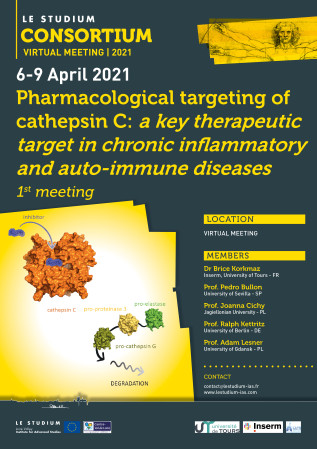Pharmacological targeting of cathepsin C: a key therapeutic target in chronic inflammatory and auto-immune diseases
1st meeting
VIRTUAL MEETING
France
Presentation
MEMBERS
- Dr Brice Korkmaz
Inserm, University of Tours - FR - Prof. Pedro Bullon
University of Sevilla - SP - Prof. Joanna Cichy
Jagiellonian University - PL - Prof. Ralph Kettriz
University of Berlin - DE - Prof. Adam Lesner
University of Gdansk - PL
Description
Cathepsin C (CatC), also known as dipeptidyl peptidase I, is a lysosomal amino peptidase belonging to the papain family of cysteine peptidases. CatC catalyzes the cleavage of two residues from the N-termini of peptides and proteins. CatC, which is ubiquitously expressed in mammals is considered to be a major intracellular processing enzyme. The best well-known function of CatC is the activation of immune cell-associated serine proteinases such as neutrophil serine proteinases (NSPs). Neutrophil-associated local proteolysis is a common pathogenic phenomenon in chronic inflammatory or autoimmune diseases. Most extracellularly secreted proteinases occur as inactive zymogens and require activation. By contrast, NSPs elastase, proteinase 3, cathepsin G, and NSP4 are fully processed and are stored as active enzymes in granules of the regulated secretory pathway. Loss of function mutations in the CatC gene cause Papillon-Lefèvre syndrome (PLS) characterized by a severe pre-pubertal periodontitis and palmoplantar keratoderma without marked immunodeficiency. The lack of CatC activity results in an almost total elimination of NSPs in neutrophils from PLS patients. Moreover, PLS fibroblasts showed reduced growth rates and abnormal morphology with marked autophagic dysfunction. The main objective of the "Cathepsin C’s Five" consortium is to explore the pharmacological targeting of CatC in fundamental and translational research for drug development. To keep track and counterbalance unwanted effects of granule-associated serine proteinases amplified by CatC, we will evaluate new chemical inhibitors directly or indirectly targeting CatC in in vitro and in vivo experimental disease models. The proteinase-lowering drugs may be directly applicable to COPD, autoimmune vasculitis or psoriatic patients. These therapeutics may also be beneficial for patients with idiopathic pulmonary fibrosis by impairing the aberrant activation of fibroblasts.
Programme (GMT+2:00 - Paris Time)
Tuesday 6th April:
14:00 Opening and Welcome Speech (B. Korkmaz, France)
14:20 LE STUDIUM Loire Valley Institute for Advances Studies (S. Gabillet, France)
14:30 The past, present and future of pharmacological targeting of cathepsin C (B. Korkmaz, France)
14:50 Targeting serine proteases through cathepsin C inhibition in neutrophil-associated skin diseases (J. Cichy, Poland)
15:10 Neutrophil serine proteases and cathepsin C in ANCA vasculitis (R. Kettritz, Germany)
15:35 Implication of the cathepsin C in the Autophagy dysfunction (M. Cordero, Spain)
Wednesday 7th April:
14:00 Oligomeric composition and allostery in cathepsin C (M. Novinec, Slovenia)
14:20 Consequences of cathepsin C inhibition on granzymes maturation in LAK cells (R. Domain, France)
14:40 Cathepsin C inhibition in mice model of influenza infection (C. Paget, France)
15:00 Effect of neutrophil serine protease inhibition in a rat model of heart transplantation (C. Korkmaz, Germany)
15:20 The role of cathepsin C in renal injury in diabetes (A. Piwkowska, Poland)
15:40 The role of the cathepsin C in pulmonary arterial remodeling (I. Borek, Austria)
16:00 Intracellular and extracellular actions of cathepsin C in human mast cells (A. Walls, UK)
Thurdsay 8th April:
14:00 Inhibition of cathepsin C to study the early impact of SARS-CoV-2 in golden Syrian hamsters (N. Meunier, France)
14:20 The role of neutrophil serine proteases in inflammatory disorders of the pancreas (A. Aghdassi, Germany)
14:40 Cathepsin C inhibition in mice model of inflammatory bowel disease (M. Rhimi, France)
15:00 Cathepsin C inhibition in mice model of cigarette smoke-induced emphysema (I. Couillin, France / AÖ. Yildirim, Germany)
15:40 Neutrophil elastase in cancer related inflammation (C. Beauvillain, France)
16:00 Cutaneous aspects of cathepsin C (K. Molloy, UK)
Friday 9th April:
14:00 Neutrophil proteases as link between inflammation and lung adenocarcinoma: the proteinase 3 in the spotlight (AS. Lamort, Germany)
14:20 Theranostic nanoparticles and autophagy regulation (F. Acar-Yağcı, Turkey)
14:40 Novel chemical tools for monitoring activity of CatC and NSPs (A. Lesner, Poland)
15:00 Granulomics, secretomics, and native mass spectrometry of molecular assemblies (M. Cadène, France)
15:20 Proteomics in disease investigation (M. Zoidakis and A. Vlahou, Greece)






